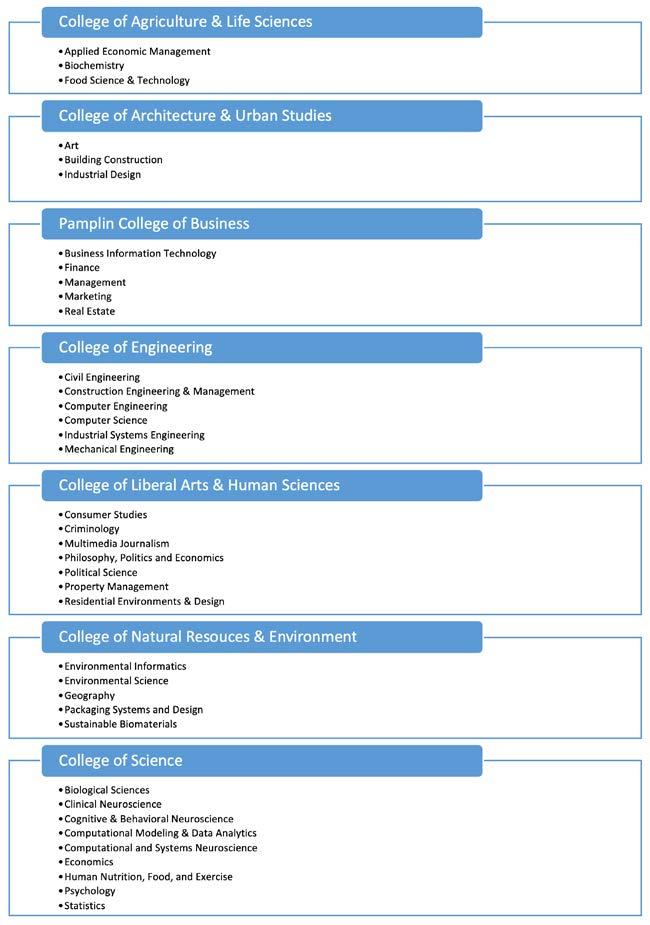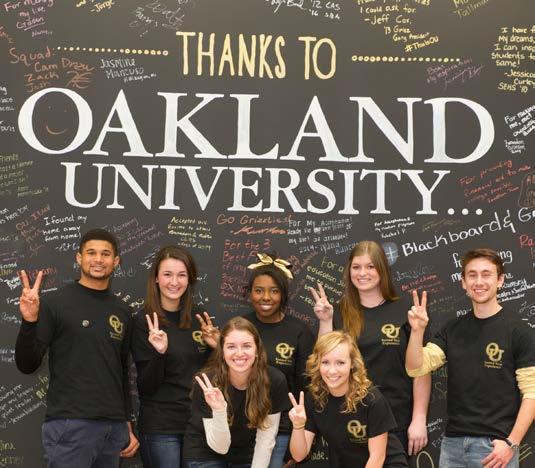
5 minute read
Explore Technology: A Meta-Major for UndecidedStudents
from E-Source for College Transitions | Vol. 17, No. 2
by National Resource Center for The First-Year Experience and Students in Transition
Zackary Underwood Director of University Studies and Explore Technology, Virginia Tech
Herbert Bruce Assistant Professor of Practice for Undergraduate Education, Department of Food Science and Technology, Virginia Tech
Advertisement
Undecided or exploratory majors are 3 of the 10 most popular majors for incoming first-year students at Virginia Tech (VT). Each college at VT hosts at least one undecided major (e.g., Exploring Life Sciences, Exploring Natural Resources, Explore Science). The University Studies Office (USO) also houses two undecided majors.
In 2017, USO staff created the Explore Technology meta-major for students who were interested in multiple colleges or majors. Metamajors provide a welcoming environment for exploration through advising conversations, introductory coursework, and investigating major options (Kafka, 2019; Selingo, 2017). Students have time to decide their path and examine an estimated 60 majors that incorporate technology. Incoming students can declare this major when they apply for admission, and it meets their needs, engages them academically, and results in strong retention.
Incoming Student Needs
Students applying to VT must declare a major on their application. Most candidates apply directly to their chosen major. Some are hesitant to choose and can apply to undecided majors, where they can examine their options and weigh major interests across multiple colleges. Other students simply do not have a particular major in mind. Whatever the reason, more than 1,500 students (over 20% of the incoming class in 2019) enroll at VT each year with an undecided major, and Explore Technology is one of them.
Traditional and nontraditional first-year students change their minds about their major for many reasons ranging from multiple interests, varying stereotypes about certain majors, and their changing identities. Anecdotal information from academic advisors indicates many students are unaware of most majors available to them.
Changing majors can be positive and negative. From a negative perspective, it can be costly, demotivating, and time-consuming.
However, moving to a major that fits the students’ academic abilities, interests, and values can be life changing for a student. Students who pursue Explore Technology are still on pace to graduate, because they explore new subjects while also completing general education graduation requirements. Students can stay with Explore Technology until they find a major that fits them, typically within one academic year, or until they reach 60 credit hours as required by university policy.
Academic Connection
Selingo (2018) believes students should explore majors within their first year rather than being pinned down to a singular choice before they begin college. To give students more structure within their exploration process, students in Explore Technology are required to take a three-hour course called UNIV 1824, Pathways to Success, which introduces the many technology-centric majors VT offers and allows for experiential research into those majors.
The three credit-hour course meets for 50 minutes three days a week; is traditionally graded (i.e., A-F); and counts as a social science, general education requirement. Each section includes a maximum of 50 students. The exploration occurs when students interact with technology but also through (a) completing self-assessments like StrengthsFinder and Type Focus; (b) studying psychosocial theories of development; and (c) getting involved on campus through major informational sessions, technology demonstrations, and academic or social organizations. Learning Outcomes for Pathways to Success include:
• Describe the components of decision-making theories related to real-life issues and problems facing college students.
• Apply psychosocial theories to college transition.
• Explain how major psychosocial theories inform a relevant major decision.
• Integrate multiple sources of information to inform a relevant major decision.
• Identify values and skills needed for academic success through cultural immersion.
• Examine research for global challenges and propose a solution using credible sources to validate the argument based on a student’s perspective major.
Retention and Persistence Rates
The Explore Technology program has also more than doubled in size in its first three years, from 84 students in the 2017-2018 cohort to 205 students in the 2019-2020 cohort. The course helps students establish a sense of belonging at VT by immersing them in the campus culture, which leads to high retention rates. Starting in 2019, each college has hosted an undecided major but with inconsistent success. For example, one college’s undecided students were retained in 2018 at a rate of 87%.
Higher retention rates yield higher persistence and ultimately higher graduation rates. Explore Technology’s persistence to the third year was 89.3%, on par with VT’s overall persistence rate of 89.4%. With a retention rate for the 2018- 2019 cohort of Explore Technology students that is 1.7% above the VT student average, the persistence rate to the third year is expected to exceed that of all students. Although these students have one significant negative factor for student retention (i.e., undecided status; Beal et al., 1980), they are retained at a higher rate than the overall student population.
Students complete their first semester with a better idea about which major is right for them. From research conducted in 2017-2018 by the University Studies office, 100% of the Explore Technology students enrolled in Pathways to Success said it helped them make more informed decisions about their major or career while 96% of the other students who took the course in other sections reported the same.
With so many major options at VT, students may not know which major is best. Explore Technology exposes students to majors that students are not as popular or well known. Figure 1 shows the variety of majors students choose.

Figure 1. Majors students pursued after Explore Technology, 2017-2018 cohort.
After completing the course, Explore Technology students can gain admission into competitive majors. Some students can apply to their new major as early as the start of their second semester. About half (49%) of the students in the fall 2018 class chose a restricted (selective) major that requires completion of certain courses or a competitive GPA. The College of Engineering was the most popular choice with 20 students, followed closely by the Pamplin College of Business with 18.
Explore Technology is a stopgap meta-major to help students who need more time to make their decision. The course formalizes the exploration process and gives students the opportunity to explore within the technological offerings at VT. Explore Technology meets student needs, improves retention, and provides a broad foundation for students in their first semester of college.
“Students who pursue Explore Technology are still on pace to graduate, because they explore new subjects while also completing general education graduation requirements.”
References
Beal, P. E., Noel, L., (1980). What Works in Student Retention: The Report of a Joint Project of the American College Testing Program and the National Center for Higher Education Management Systems. American College Testing Program.
Kafka, A. (2019, August 11). How some colleges are helping freshmen find their academic focus. The Chronicle of Higher Education. https://www.chronicle. com/article/How-Some-Colleges-Are-Helping/246913
Selingo, J. (2017, November 3). Six myths about choosing a college major. The New York Times. https://www.nytimes.com/2017/11/03/education/edlife/ choosing-a-college-major.html
Selingo, J. (2018, May 20). It’s time to end college majors as we know them. The Chronicle of Higher Education. https://www.chronicle.com/article/It-s-Timeto-End-College/243448




